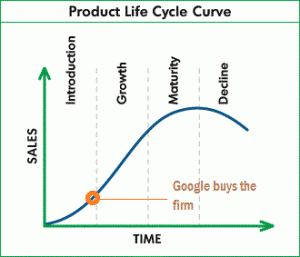How important is an ecosystem? How about technology start-ups? Just like an ecosystem is important for living organisms, the same holds true for start-ups. In a world that is increasingly going mobile, we often hear open systems and open source driving the next technology revolution, but do we essentially have the right ecosystem in place? The mobile landscape and personal computing today has increasingly become platform dependent: the platform that you choose decides what you end up doing and not the other way round. Sounds confusing? Let’s try to explain. Considering the three major arenas- Mobiles, Computers and Tablets- who exactly are the major platform players? Microsoft, Apple and Google. While Microsoft and Apple have opted for closed system, Google follows an open source system for its android platform.
Android today is the most popular smart phone and tablet pc platform, primarily due to its high customisation possibilities and open source nature, leading to what people call the creation of the ultimate ecosystem. The result: a user today can find application for any purpose right from killing a mosquito to downloading music. But did Google create Android? Google today virtually controls the mobile market, the search market and the world-wide web. So while on one hand it is creating an eco-system, it is also transforming itself into the largest technology giant there ever has been and there ever will be. How? Hire people smarter than you and acquire companies that have smarter products.
Google has a long history of acquisitions starting way back in 2001 when it acquired Deja, a usenet (similar to bulletin board), that today runs at the heart of Google groups. Genius labs is another example. This company was acquired in the year 2003, and today runs as Blogger. The following table illustrates how some of the acquisitions have contributed to growth of Google:
|
Major Acquisition
|
Presently integrated in
|
|
Deja
|
Google groups
|
|
Pyra Labs, Genius Labs
|
Blogger
|
|
Applied Semantics
|
Adsense
|
|
Urchin Software Corporation
|
Google Analytics
|
|
Android, Inc.
|
Android
|
|
Upstartle
|
Google Docs
|
|
Omnisio, On2
|
Youtube
|
|
Katango
|
Google+
|
|
Channel Intelligence
|
Google Shopping
|
|
Neotonic Software, rMail, Postini
|
Gmail
|
|
Endoxon
|
Google maps
|
In fact most of the technology that Google today boasts of are those that had their inception in different companies. Furthermore, from 2010 onwards Google has on an average acquired a company every 3 weeks, the most recent being Channel Intelligence for 125 million USD on February 6th this year.
|
Year
|
Number of acquisitions
|
|
2001
|
2
|
|
2003
|
6
|
|
2004
|
5
|
|
2005
|
10
|
|
2006
|
10
|
|
2007
|
15
|
|
2008
|
2
|
|
2009
|
6
|
|
2010
|
27
|
|
2011
|
26
|
|
2012
|
12
|
|
2013
|
1
|
Total companies acquired: 122
If we consider the Google strategy, it buys out a firm in its nascent stage. On a product life cycle curve, that will refer to disrupting and halting a life cycle in the introduction phase.
This serves two purposes:
1. It ensures that its current portfolio of products always remain in growth phase by consistently acquiring new technology and enhancing user experience.
2. It prevents any other company from reaching the scale Google has reached today. The moment it sees such a threat, it will buy it out. The company being in the nascent stage will see value in the lucrative offer that Google will make and accept it. In case, it doesn’t Google will copy the idea and launch it in a scale that cannot be matched by the start-up.
So essentially is Google the creator of this great developer ecosystem or its largest carnivore? Perhaps, it performs both the roles with great perfection.
More importantly can any company become another Google? The answer perhaps lies in Facebook. The idea has to be so offbeat that Google or any of these giants should not feel there is any chance to make money through it. When Facebook was started by Mark Zuckerberg, he meant it for fun and neither did he believe that one day he would be the world’s youngest billionaire and this was the reason he survived! Moreover he managed to get Microsoft on board for a minority stake, ensuring that Microsoft would always step in if Google made a very lucrative offer to the Private investors and further ensuring the existence of Facebook by getting itself listed. But is Facebook very different from Google? Not really. With 33 acquisitions, 29 of which are from 2010 onwards, Facebook is ready to ensure you do not get a better social network experience from any other company in near future. The death of Instagram is a clear pointer in this regard.
I am not against acquisitions by technology companies. It is the pace of this inorganic growth being followed by the leaders that is alarming. Every bit of our personal data is today being monitored by Google & Facebook and is on Windows or Mac Platform. Are we aiding the death of the developer eco-system by consistently adopting their products? If tomorrow, you decide to start an IT firm can you aspire to become the next Google and not getting killed by a takeover? The answer lies in having an idea so radically different that it makes these tech giants out rightly reject it. That alone can ensure the survival.
Till then let us celebrate our open source (and closed) platforms with renowned hope of a developer ecosystem and with an augmented sense of reality! Oops, did I refer Google Glass? (Sorry, that’s secret!)
Tags:
google microsoft startup
You might like reading:
Posted: December 27, 2015
The Needs and wants of the consumers and satisfaction of those needs and wants are two extreme ends of the whole chain. There is a big gap between both the ends. Marketing help in bridging the gap between the two. Marketing is basically assessing the overt and latent requirements of the consumers and creates customer delight through fulfilling the market […]

Posted: December 15, 2013
Profit and Growth are the essentials in a business. The contribution of HR to the bottom-line has always been argued. The return on investment from HR practices is not quantified according to critics. The objective measurement is essential for the framework which is in place in the organization. HR has evolved into a line function is the observation made in […]
































